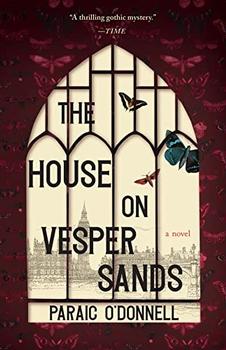Summary | Excerpt | Reading Guide | Reviews | Beyond the Book | Readalikes | Genres & Themes | Author Bio

Critics' Opinion:
Readers' Opinion:
First Published:
Jan 2021, 408 pages
Paperback:
Jan 2022, 408 pages
 Book Reviewed by:
Book Reviewed by:
Rachel Hullett
Buy This Book
The lock was stiff, but gave without a sound. She had greased it too, working the oil in with a crochet hook. Again she waited, closing her eyes this time to sharpen her hearing. Nothing. She eased the door open by a fraction. Silence still. Another inch.
She stopped dead. The noise had been slight—a momentary shudder of heavy iron before her hand stilled it—and Mr. Carew's hearing was not keen. But in this silence even he might have been disturbed. Esther glanced at the workbench, where her sewing case lay open. She did not wish for it, in spite of all his petty cruelties, but she had given it thought. If he discovered her now, she would have nothing to lose by it. She was quicker by far, and would close the distance in three strides. He would find out then what use a stiletto might be put to. She would do what she must.
But no, he only coughed again, and presently she heard a low chuckling. He had found something else to amuse him in the Illustrated London News. Esther returned her attention to the strongbox door. In one movement, soft but swift, she opened it halfway. It was all she needed.
The crystal vessels were arranged on a tray that occupied the whole of the middle shelf. It was lined with velvet, and each bottle stood in its own recess. There were eleven in all—there had been twelve, but one recess was now empty—and until now she had only glimpsed them. They were beautifully made, fluted and intricately faceted, and gleamed mutely in the yellowish light. A man in Antwerp had fashioned them, that much she knew, and to His Lordship's particular design. Nothing like them could be had in all of England, Mr. Carew maintained. It was more than he ought to have said, but he took a pitiful pride in such things and a braggart is a poor keeper of secrets. Esther did not know everything, but she knew enough.
Of the eleven vessels, eight were empty and discoloured. They could be used only once, that much she had learned, too, and yet each was returned afterwards to its place. When they had put it to use—later tonight, perhaps, she did not know—they would bring back a ninth blackened bottle. They would see then what had been done, but that was a moment she would not witness. It was a pity.
The remaining three were intact. At first glance they too appeared empty, but their stoppers were in place still and cloaked in a rich wax. At the base of each lay a dark fraction of viscous oil. The resin, she had heard them call it. She knew, too, that this resin turned to vapour once opened to the air, that it was the vapour that did the work. Beyond that, no more had been said in her hearing, but no more had been needed. She had formed a clear enough notion.
It was not only the resin they talked of, but the vessels themselves. The Dutchman would make no more, for reasons she had not discovered. Maybe they had quarelled with him, or he had taken ill. Another craftsman might be found, but it would be no easy matter. They were not priceless, these bottles, but they were something near to it.
From a hidden fold in her skirts, Esther worked free what she had made. It was a satchel of sorts, fashioned for strength from sailcloth. It was divided into chambers or pouches, and each of these was lined with quilting so that the vessels would make no noise when they were carried side by side. With the utmost care, she grasped the neck of an intact bottle and lifted it from its place. It was a heavy thing, though it held what could hardly be more than an ounce of fluid. Still, it was smaller than she had judged and disappeared entirely when she slipped it into its pouch. That was good. Better too much room than too little.
Again Esther waited, though it was a struggle now to keep still. Wait, girl. Wait and listen.
She tucked the second bottle into the satchel, where it nestled softly by its neighbour, then waited again. Ten seconds. Twenty. She took the third vessel.
Excerpted from The House on Vesper Sands by Paraic O'Donnell. Copyright © 2021 by Paraic O'Donnell. Used with the permission of the publisher, Tin House. Copyright © 2020 by Paraic O'Donnell.




Censorship, like charity, should begin at home: but unlike charity, it should end there.
Click Here to find out who said this, as well as discovering other famous literary quotes!
Your guide toexceptional books
BookBrowse seeks out and recommends the best in contemporary fiction and nonfiction—books that not only engage and entertain but also deepen our understanding of ourselves and the world around us.